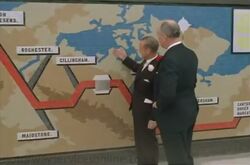Motorway Industry Regulator

Since motorway service areas were deregulated in 1992, the industry is supposed to be a totally free market. There is no industry regulator, because the government theory was that competition would be enough to keep standards high.
In 2017, the independent watchdog group Transport Focus started an annual review of motorway service areas in England. They cannot force through changes (and don't take individual customer feedback), and service areas can opt out of their reviews. Transport Focus work very closely with the operators who opt in, so their role is more like consultants than a regulator, and they are more interested in industry matters like sales systems.
Local authorities have powers over some issues, such as environmental health and planning law.
National Highways are responsible for setting out the regulations that govern services in England, which are usually adopted by highway authorities across the UK. If a service area breaches those regulations, it should have its road signs taken down and its connection to any motorways sealed off. However, these regulations only deal with technical matters (like the number of parking spaces), and don't cover the quality of facilities.
Historical Situation
In 2008 it looked like things might change. A new document called Circular 01/2008 made the regulations much easier to read, and contained a reminder that operators should "endeavour to provide high-quality facilities". It also called for an independent rating system. In the introduction, it stated that the Highways Agency (now called National Highways) would only intervene with breaches of policy, and not "other operational matters" - it then went on to specifically ruled out responsibility for pricing or staffing complaints.
This turned out to be a brief moment. New government policy in 2013 called for the industry to be deregulated again, so Circular 02/2013 was produced and removed those few references to quality - and most of the other regulations. It also removed the rule stopping service areas being built too close together, which is what the Highways Agency used to use to discourage poor quality proposals.
Some sense was restored with Circular 01/2022, with the ban on "destinations" returning and the food requirement expanded to be "cooked hot food for consumption of premises", but this is still far from any real industry regulation.
Prior to 1992 (and especially prior to 1979), motorway service areas had to work closely with the government, who owned the land most of them were built on. They used their powers as landlord to approve changes. The MSA Branch (1969-1982) carried out unannounced inspections, and maintained a close relationship with each manager so they discuss areas for improvement. While the MSA Branch couldn't really force through improvements, site managers wanted to maintain a good relationship, and a bad reputation could cause them to lose future contracts.
An inspection system was created in 1978 on the advice of the Prior Report. The idea was that rent rebates would be offered for good results. The new government elected in 1979 immediately scrapped the scheme, as it interfered with what they called "private enterprise". The Department of Transport remained the ultimate regulator, but they had little involvement with standards.
Who owns the land?
Aside from 21 exceptions, all service stations are built on privately owned land. Even in the case of the 21 owned by National Highways, their agreement with the operator does not give National Highways any additional reasons to intervene.